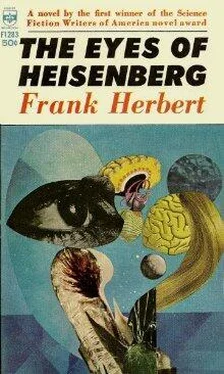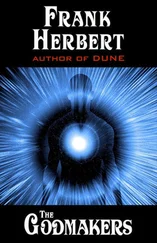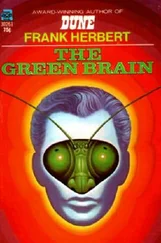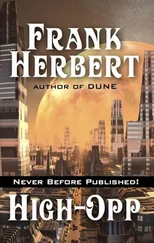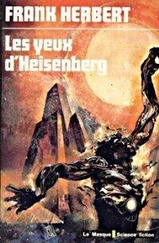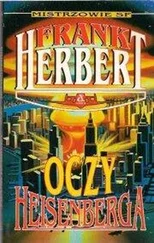Svengaard remained silent, frozen by the emotionless clarity of the man’s speech. A hard, brutal man, he thought. A tough man, prepared for any violence. A killer.
“Into the cab with him then,” Glisson said. “Everyone into the cab. We must get…” The Cyborg broke off, stared out toward the megalopolis.
Svengaard turned toward the strings of blue-white light glittering far away and cold. A winking golden flare had appeared amidst the lights on his left. Another blazed up beyond it—a giant’s bonfire set against the background of distant, moon-frosted mountains. More yellow flares appeared to the right. A bone-chilling rattle of sonics shook him, jarred a sympathetic metal dissonance from the van.
“What’s happening?” Lizbeth hissed.
“Quiet!” Glisson said. “Be quiet and observe.”
“Gods of life,” Lizbeth whispered, “what is it?”
“It is the death of a megalopolis,” Boumour said.
Again, sonics rattled the van.
“That hurts,” Lizbeth whimpered.
Harvey pulled her close, muttered, “Damn them!”
“Up here it hurts,” Igan said, his voice chillingly formal. “Down there it kills.”
Green fog began emerging from the wilderness some ten kilometers below them. It rolled out and down like a furious downy sea beneath the moon, engulfing everything—hills, the gem-like lights, the yellow flares.
“Did you think they would use the death fog?” Boumour asked.
“We knew they would use it,” Glisson said.
“I suppose so,” Boumour said. “Sterilize the area.”
“What is it?” Harvey demanded.
“It comes from the vents where they administered the contraceptive gas,” Boumour said. “One particle on your skin—the end of you.”
Igan moved around, stared down at Svengaard. “They are the ones who love us and care for us,” he mocked.
“What’s happening?” Svengaard asked.
“Can you not hear?” Igan asked. “Can you not see? Your friends the Optimen are sterilizing Seatac. Did you have friends there?”
“Friends?” There was a broken quality to Svengaard’s voice. He turned back to stare at the green fog. The distant lights had all been extinguished.
Again, sonics chattered through them, shook the ground, rattled the van.
“What do you think of them now?” Igan asked.
Svengaard shook his head, unable to speak. He wondered why he had no sensory fuse system to shut off this scene. He felt chained to awareness through sense organs gone abnormal beyond any previous experience… a permissive aberration. His senses were deceiving him, that was it. This was a special case of self-deception.
“Why don’t you answer me?” Igan asked.
“Leave him alone,” Harvey said. “We’ve griefs of our own. Haven’t you any feelings?”
“He sees it and does not believe,” Igan said.
“How could they?” Lizbeth whispered.
“Self-preservation,” Boumour rumbled. “A trait our friend Svengaard doesn’t seem to have. Perhaps it was cut out of him.”
Svengaard stared at the rolling green cloud. So silent and stealthy it was. The great reach of darkness where once there had been light and life filled him with a raw awareness of his own mortality. He thought of friends down there—the hospital staff—embryos, his playmate-wife.
All destroyed.
Svengaard felt emptied, incapable of any emotion—even grief. He could only question, What was their purpose?
“Into the cab with him,” Glisson said. “On the floor in the rear.”
Ungentle hands lifted Svengaard—he identified Boumour and Glisson. The driver’s unemotional quality confused Svengaard. He had never before encountered quite that abstract detachment in a human being.
They pushed him onto the floor of the van’s cab. The sharp edge of a seat brace dug into his side. Feet came in around him. Someone put a foot on his stomach, recoiled. The turbines came alive. A door was slammed. They glided into motion.
Svengaard sank into a kind of stupor.
Lizbeth seated above him heaved a deep sigh. Hearing it, Svengaard was roused to a feeling of compassion for her, his first emotion since the shock of seeing the megalopolis die.
Why did they do it? he asked himself. Why?
In the darkness, Lizbeth gripped Harvey’s hand. She could see in an occasional patch of moonglow the outline of Glisson directly ahead of her. The Cyborg’s minimal movement, the sense of power in every action, filled her with growing disquiet. The scar of her operation itched. She wanted to scratch, but feared calling attention to herself. The Courier Service had been a long time building its own organization, deceiving both the Cyborgs and the Optimen. They’d done it partly through self-effacement. Now, in her fear, she sank back into that treatment.
Through their hands, Harvey signaled, “ Boumour and Igan, I read them now. They’re new Cyborgs. Probably just a first linkage with implanted computers. They’re just learning the price, shedding their normal human emotional reactions, learning to counterfeit emotion.”
She absorbed this, seeing them through Harvey’s deduction. He often read people better than she did. She re-read what she had seen of the two surgeons.
“Do you read it?” he signaled.
“You’re right. Yes.”
“It means a total break with Central. They can never go back.”
“That explains Seatac,” she signaled. She began to tremble.
“And we can’t trust them,” Harvey said. He pressed her close, soothing her.
The van labored up through the foothills skirting open meadows, following ancient tracks, an occasional stream-bed. Shortly before dawn, it swerved left down a firebreak and into a stand of pines and cedars, squeezed its way through a narrow lane there with its blowers kicking up a heavy cloud of forest duff behind. Glisson pulled to a stop behind an old building, moss on its sides, small curtained windows. Pseudo-ducks with a weedy patina and grass-grown signs that they hadn’t been animated in years, made a short file near the building—pale moon-figures in the light of a single bulb high up under the building’s eaves.
Turbines whined to silence. They could hear then the hum of machinery and looking toward the sound saw the dull silver outline of a ventilator tower among the trees.
A door at the corner of the building opened. A heavy-headed man with a big jaw, stoop-shouldered, emerged blowing his nose into a red handkerchief. He looked old, his face a mask of subservience.
Glisson said, “It’s the sign. All is safe here… for the moment.” He slipped out, approached the old man, coughed.
“A lot of sickness around these days,” the old man said. His voice was as ancient as his face, wheezing, slurring the consonants.
“You’re not the only one with troubles,” Glisson said.
The old man straightened, shed the stooped look and subservient manner. “S’pose you’re wanting a hidey hole,” he said. “Don’t know if it’s safe here. Don’t even know if I oughta hide you.”
“I will give the orders here,” Glisson said. “You will obey.”
The old man studied Glisson a moment, then a look of anger washed over his face. “You damn’ Cyborgs!” he said.
“Hold your tongue,” Glisson said, his voice flat. “We need food, a safe place to spend the day. I shall require your help in hiding this van. You must know the surrounding terrain. And you will arrange other transportation for us.”
“Best cut it up and bury it,” the old man said, his voice surly. “Been a hornet’s nest stirred up. Guess you know that.”
“We know,” Glisson said. He turned, beckoned to the van. “Come along. Bring Svengaard.”
Читать дальше
